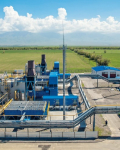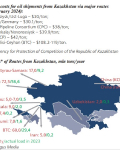Exclusive
Gas as the Key to the Country❜s Decarbonization

Over the past years, the national company QazaqGaz has implemented numerous large-scale projects in sustainable development. Additionally, the company has been reporting on sustainable development for the second consecutive year according to the GRI (Global Reporting Initiative) standards. Based on last year’s results, it received its first ESG rating from the leading rating agency Morningstar Sustainalytics, ranking seventh among gas transportation companies globally and first among hydrocarbon production companies in Kazakhstan, as evaluated by this agency. Sanzhar Zharkeshov, General Director of NC QazaqGaz JSC, discusses the company's key achievements and development plans in ESG.
Challenges in Kazakhstan❜s Upstream: High Costs and Industry Regulation

Halyk Finance Analytics Center has prepared a review of Kazakhstan's oil sector for 2023 (authored by expert Sanzhar Kaldarov and advisor to the board chairman Murat Temirkhanov). Petroleum Journal introduces its readers to the main points of the review concerning the challenges currently faced by the oil and gas extraction industry.
KIOGE-2024
«Leading the Charge: Our Global Commitment to Methane Abatement»

ExxonMobil has partnered with Kazakhstan for 30 years in the development of the nation’s resources. As one of the leading foreign investors in the Republic of Kazakhstan with over $29 billion investment in three world-scale projects – Tengiz, Kashagan and the Caspian Pipeline Consortium – we are proud of the partnerships that we have forged with the Republic and are privileged to be part of the country’s remarkable growth.
Chevron in Kazakhstan: Ambitious Goals and a Mutually Beneficial Partnership

Chevron, one of the world’s leading integrated energy companies, has been partnering with Kazakhstan since 1993. The company believes affordable, reliable and ever-cleaner energy is essential to enabling human progress. Chevron produces crude oil and natural gas; manufactures transportation fuels, lubricants, petrochemicals and additives; and develops technologies that enhance the business and the industry.
Cooperation of TCO and IT: Innovations for the Development of the Country

Today, it is impossible to imagine the operational activities of any business without modern digital technologies, and even more so such a complex and important industry for the economy of the Republic of Kazakhstan as petroleum. The digital transformation of operations creates a new digital culture that increases safety, productivity, and value at all stages. The number of digital solutions optimizing processes and saving time is increasing from year to year in Kazakhstan's largest oil-producing company Tengizchevroil LLP (TCO).
How Can We Make Industry More Climate-friendly?

Hydrogen for industry is the climate-friendly way to make industrial processes more sustainable. The industry requires large quantities of hydrogen. Unfortunately, the current methods of generating hydrogen emit the greenhouse gas carbon dioxide. To generate hydrogen in a more climate-friendly manner we need highly specialised pumps.
Ahead of Time: CPC Safety Day in Almaty

The high-altitude Medeu Sports Complex, located in scenic surroundings near Almaty, hosted participants of the 12th International Safety Day of the Caspian Pipeline Consortium (CPC) on September 10. Safety Day is an annual company event aimed at increasing employee motivation towards safe work practices and demonstrating the company's leadership commitment to high occupational safety standards, both in production and daily activities.
30 Years of ILF Consulting Engineers in Kazakhstan: Engineering Excellence and Innovation

As ILF Consulting Engineers commemorates its 30th anniversary in Kazakhstan, we reflect on the significant impact the company has had on the nation’s oil and gas sector. Since its establishment in 1994, ILF has become a key player in Kazakhstan's engineering landscape, contributing to major infrastructure and energy projects. This milestone celebrates not just the passage of time but the deep partnerships, innovations, and contributions that have defined ILF’s journey in this vibrant region.
Our Work Principle: Success Favors Effort Hi-Tech Drilling: New Horizons of Directional Drilling

In an exclusive interview with Petroleum, Nurken Mirzabekov, General Director of AVC Group LLP, discusses how the company, drawing on years of experience, is implementing new advanced technologies in Kazakhstan’s oil refining industry.
Hi-Tech Drilling: New Horizons of Directional Drilling

In the modern world, the process of drilling oil and gas wells is becoming increasingly demanding in terms of drilling efficiency and accuracy. It leads to the use of highly efficient equipment and an increase in the cost of the final product - the well. The development of hard-to-recover reserves is also steadily increasing, which requires the use of hi-tech equipment and leads to high economic costs.
Geology
Current Technologies Used for Data Acquisition in Drilling

As is known, oil and gas reservoirs vary by trap type, reservoir, rock formation, migration type, and cap rock. Based on this data, geologists determine the area of the territory, the thickness of the prospective reservoir rock, the expected porosity of the rock, the type of hydrocarbons present in the trap, and so on. The data for such reservoir assessments are obtained through well logging and subsequent interpretation.
Projects
How Much Can Central Asia Compensate Gazprom for the Lost European Market?

The major contracts for the supply of Russian gas to Central Asia, announced earlier this year and expected to be signed during the St. Petersburg International Economic Forum (SPIEF) in June, have ultimately resulted in the extension of an expanded agreement with Uzbekistan and a contract for the supply of 340 mln cubic meters of gas annually from Russia to Kyrgyzstan's thermal power plants.
Through Russia, Across the Caspian, or to China?

The Presidential Administration of Kazakhstan and the Antimonopoly Agency Have Different Opinions on the Matter On July 30, 2024, the President of Kazakhstan, Kassym-Jomart Tokayev, approved the National Development Plan of the Republic of Kazakhstan until 2029.
Prospects and Barriers to the Development of Kazakhstan❜s LPG Market

The LPG market in Kazakhstan presents an interesting alternative to the Russian market despite the latter's significant advantage in balance factors. In contrast to a liberalized market model, the market in Kazakhstan is subject to strict regulation. We present a detailed analysis of the LPG market in the Republic of Kazakhstan.
Oil Chronicles
Oil Chronicles. April 2024

April 1, Alibek Kuantyrov was appointed the new General Director of the KazEnergy Association, after resigning as Minister of National Economy in February 2022. His background includes working in the office of the first president of Kazakhstan and the Ministry of Finance. His connection to the oil sector is through a four-month tenure in 2013 as Deputy Chairman of the Committee on Geology and Subsoil Use. He succeeded 65-year-old Kenzhebek Ibrashev, who had led KazEnergy since April 2021.
Oil Chronicles. May 2024

At the meeting of the Energy Council of the Republic of Kazakhstan, chaired by Prime Minister Olzhas Bektenov, the parameters of agreements between the national company QazaqGaz and the Qatari UCC Holding for the construction of gas industry infrastructure in Kazakhstan were approved.
Oil Chronicles. June 2024

June 2, at the OPEC+ meeting, held for the first time in Riyadh rather than Vienna, participants agreed to extend the voluntary oil production cuts until the end of 2025. The countries decided to prolong the additional voluntary reductions of 1.65 mln barrels per day, initially announced in April 2023, until the end of December 2025.
Legislation
The Mutual Agreement Procedure with a Foreign State as a Defense Mechanism in Tax Disputes

According to the author's observations, since the introduction of administrative justice in Kazakhstan, the quality of tax dispute resolution has been steadily improving. This is not only reflected in the favorable court statistics for businesses and citizens, but also in the evolving status of administrative courts. Much of this progress is driven by judges adopting new, and at times quite bold, approaches to resolving longstanding legal conflicts.



